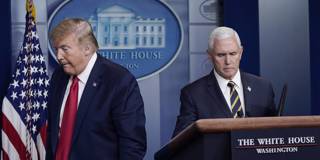Although the US mobilization for war in the 1940s seems like a close comparison to the sudden economic stop of the COVID-19 era, the two episodes have little in common. Simply put, World War II placed far greater demands on a government that was far more competent to handle them.
CAMBRIDGE – Although the COVID-19 pandemic feels unprecedented, it is not the first time that exogenous forces have radically disrupted civilian life. The most common parallel is to the American mobilization for World War II. In December 1940 – almost a year before Pearl Harbor, and as Britain stood virtually alone against Nazi aggression – US President Franklin D. Roosevelt declared, “We must be the great arsenal of democracy.”

CAMBRIDGE – Although the COVID-19 pandemic feels unprecedented, it is not the first time that exogenous forces have radically disrupted civilian life. The most common parallel is to the American mobilization for World War II. In December 1940 – almost a year before Pearl Harbor, and as Britain stood virtually alone against Nazi aggression – US President Franklin D. Roosevelt declared, “We must be the great arsenal of democracy.”